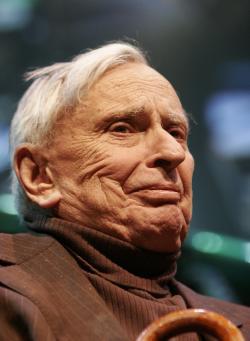When a great writer passes away, I like to mark the occasion by spending a moment with one of his or her texts—it’s a way of remembering that powerful words have the ability to transcend mortality, and, less romantically, a quiet means of mourning the fact that no new ones are forthcoming. So, with the news of Gore Vidal’s death last night, a friend prompted me to visit the author’s classic 1981 essay, “Some Jews & The Gays.” You should do the same. Not only is the piece a Platonic-level example of the polemic form—a contrapuntal masterpiece of astute close-reading, wicked humor, incisive-yet-approachable analysis, and, best, a thousand paper-cut castigations—but its main points are also still relevant today.
Vidal uses the occasion of reviewing Renaud Camus’ Tricks, a diaristic detailing of the author’s active gay sex history, to elucidate what he calls “certain curious facts of our social and cultural life”—namely, the common themes shared by homophobia and anti-Semitism in American culture. With a main course as dense as that in front of him, discussing Tricks becomes more of a seventh-page dessert; Vidal’s meat is an arrestingly ignorant piece by the neo-con journalist Midge Decter in Commentary. In “The Boys on the Beach,” Decter uses observations gleaned from her vacation in the Fire Island Pines (a gay Long Island beach enclave) to conclude, in Vidal’s searing words:
Since homosexuals choose to be the way they are out of idle hatefulness, it has been a mistake to allow them to come out of the closet to the extent that they have, but now that they are out (which most are not), they will have no choice but to face up to their essential hatefulness and abnormality and so be driven to kill themselves with promiscuity, drugs, S-M and suicide.
This truly “hateful” line of reasoning is only possible because of the fundamental (and perhaps willful) inability to think about gays as individual human beings. As Vidal points out repeatedly over the course of the essay, “same-sexers” are always an abstract other to the homophobe, a faceless mélange of stereotypes, projections and threats (most importantly, to another airy concept, the “family”). And, unlike real, flesh-and-blood people who have a tendency to evoke messy feelings of empathy and basic respect, abstractions are emotionally inert things, easily beaten and molded into whichever shape best fits your ideology.
On this so-called “National Chick-fil-A Appreciation Day,” gays are again being treated as an abstraction. The restaurant chain supposedly welcomes all customers individually; yet, at the corporate level, it actively funds efforts to deny basic civil rights to some of those same customers once they’ve left the drive-through and disappeared again into the hazy category of “same-sex couples.” This illogic is of a piece with the currently popular notion that you can be anti-gay rights without being anti-gay people, which, as Amanda Marcotte points out in her post on Jennifer Roback Morse, is intellectual dishonesty on a grand scale.
Clearly, some things haven’t changed in the time between Decter and Chick-fil-A. Sure, the homophobe’s language has become more oblique and social conservatism has had its cloying smile brightened, but the core act of violence that Vidal identified three decades ago remains in play: Homosexuals are still an impersonal blob, a curious social aberration, an issue to be discussed, analyzed, diagnosed, voted on and used to sell chicken sandwiches with pickles—but never respected as a community of thinking, feeling individuals. Forgoing waffle fries is all well and good, but the target truly worthy of a boycott is this dehumanizing paradigm. Vidal resisted it, and, as we celebrate his life, so should we.
